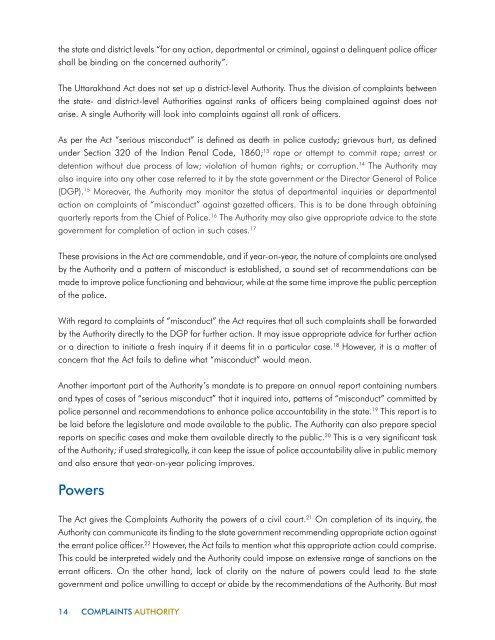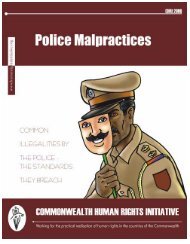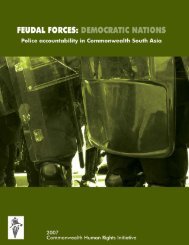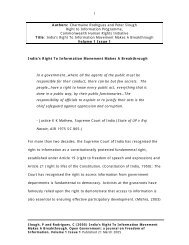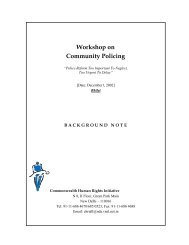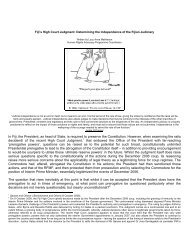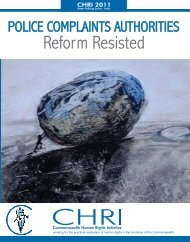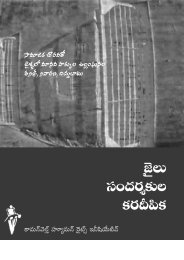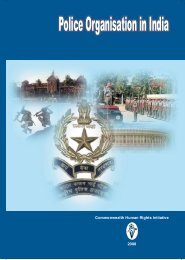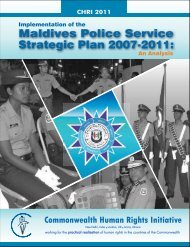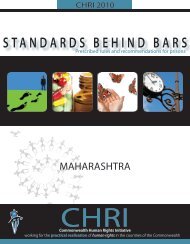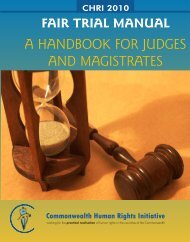Uttarakhand State Police Complaints Authority - Commonwealth ...
Uttarakhand State Police Complaints Authority - Commonwealth ...
Uttarakhand State Police Complaints Authority - Commonwealth ...
You also want an ePaper? Increase the reach of your titles
YUMPU automatically turns print PDFs into web optimized ePapers that Google loves.
the state and district levels “for any action, departmental or criminal, against a delinquent police officershall be binding on the concerned authority”.The <strong>Uttarakhand</strong> Act does not set up a district-level <strong>Authority</strong>. Thus the division of complaints betweenthe state- and district-level Authorities against ranks of officers being complained against does notarise. A single <strong>Authority</strong> will look into complaints against all rank of officers.As per the Act “serious misconduct” is defined as death in police custody; grievous hurt, as definedunder Section 320 of the Indian Penal Code, 1860; 13 rape or attempt to commit rape; arrest ordetention without due process of law; violation of human rights; or corruption. 14 The <strong>Authority</strong> mayalso inquire into any other case referred to it by the state government or the Director General of <strong>Police</strong>(DGP). 15 Moreover, the <strong>Authority</strong> may monitor the status of departmental inquiries or departmentalaction on complaints of “misconduct” against gazetted officers. This is to be done through obtainingquarterly reports from the Chief of <strong>Police</strong>. 16 The <strong>Authority</strong> may also give appropriate advice to the stategovernment for completion of action in such cases. 17These provisions in the Act are commendable, and if year-on-year, the nature of complaints are analysedby the <strong>Authority</strong> and a pattern of misconduct is established, a sound set of recommendations can bemade to improve police functioning and behaviour, while at the same time improve the public perceptionof the police.With regard to complaints of “misconduct” the Act requires that all such complaints shall be forwardedby the <strong>Authority</strong> directly to the DGP for further action. It may issue appropriate advice for further actionor a direction to initiate a fresh inquiry if it deems fit in a particular case. 18 However, it is a matter ofconcern that the Act fails to define what “misconduct” would mean.Another important part of the <strong>Authority</strong>’s mandate is to prepare an annual report containing numbersand types of cases of “serious misconduct” that it inquired into, patterns of “misconduct” committed bypolice personnel and recommendations to enhance police accountability in the state. 19 This report is tobe laid before the legislature and made available to the public. The <strong>Authority</strong> can also prepare specialreports on specific cases and make them available directly to the public. 20 This is a very significant taskof the <strong>Authority</strong>; if used strategically, it can keep the issue of police accountability alive in public memoryand also ensure that year-on-year policing improves.PowersThe Act gives the <strong>Complaints</strong> <strong>Authority</strong> the powers of a civil court. 21 On completion of its inquiry, the<strong>Authority</strong> can communicate its finding to the state government recommending appropriate action againstthe errant police officer. 22 However, the Act fails to mention what this appropriate action could comprise.This could be interpreted widely and the <strong>Authority</strong> could impose an extensive range of sanctions on theerrant officers. On the other hand, lack of clarity on the nature of powers could lead to the stategovernment and police unwilling to accept or abide by the recommendations of the <strong>Authority</strong>. But most14 COMPLAINTS AUTHORITY


